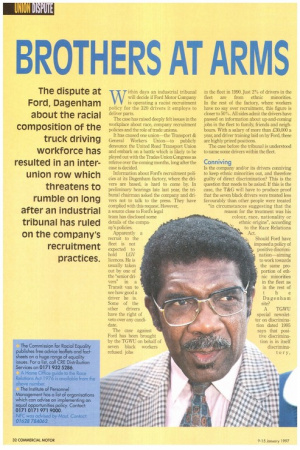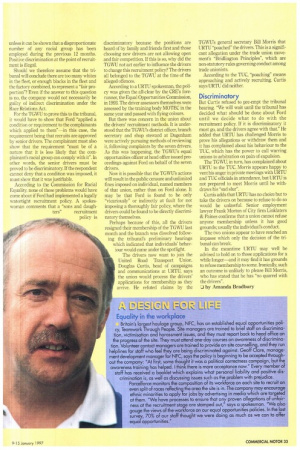BROTHERS AT ARMS
Page 34

Page 35

If you've noticed an error in this article please click here to report it so we can fix it.
The dispute at Ford, Dagenham about the racial composition of the truck driving workforce has resulted in an inter union row which threatens to rumble on long after an industrial tribunal has ruled on the company's recruitment practices.
Within days an industrial tribunal will decide if Ford Motor Company is operating a racist recruitment policy for the 320 drivers it employs to deliver parts.
The case has raised deeply felt issues in the workplace about race, company recruitment policies and the role of trade unions.
It has caused one union—the Transport & General Workers Union—to publicly denounce the United Road Transport Union and embark on a battle which is likely to be played out with the Trades Union Congress as referee over the coming months, long after the case is decided.
Information about Ford's recruitment policies at its Dagenham factory, where the drivers are based, is hard to come by. In preliminary hearings late last year, the tribunal chairman asked the company and drivers not to talk to the press. They have complied with this request. However, a source close to Ford's legal team has disclosed some details of the company's policies.
Apparently a recruit to the fleet is not expected to
hold LGV
licences. He is usually taken
out by one of the "senior dri. vers" in a Transit van to see how good a driver he is. Some of the other drivers have the right of veto over any candidate.
The case against Ford has been brought by the TGWU on behalf of seven black workers refused jobs in the fleet in 1990. Just 2% of drivers in the fleet are from ethnic minorities. In the rest of the factory, where workers have no say over recruitment, this figure is closer to 50%. All sides admit the drivers have passed on information about up-and-coming jobs in the fleet to family, friends and neighbours. With a salary of more than £30,000 a year, and driver training laid on by Ford, these are highly prized positions.
The case before the tribunal is understood to name some drivers within the fleet.
Conniving
Is the company and/or its drivers conniving to keep ethnic minorities out, and therefore guilty of direct discrimination? This is the question that needs to be asked. If this is the case, the T&G will have to produce proof that the seven black drivers were treated less favourably than other people were treated "in circumstances suggesting that the reason for the treatment was his colour, race, nationality or ethnic origins", according to the Race Relations Act.
Should Ford have imposed a policy of positive discrimination—aiming to work towards the same proportion of ethnic minorities in the fleet as in the rest of
Dagenham site?
A TGWU special newsletter on discrimination dated 1995 says that positive discrimination is in itself discriminatory, unless it can be shown that a disproportionate number of any racial group has been employed during the previous 12 months. Positive discrimination at the point of recruitment is illegal.
Should we therefore assume that the tribunal will conclude there are too many whites in the fleet, or enough blacks in the fleet and the factory combined, to represent a "fair proportion"? Even if the answer to this question is no, the company would not necessarily be guilty of indirect discrimination under the Race Relations Act.
For the TGWU to prove this to the tribunal, it would have to show that Ford "applied a condition or requirement to the complainants which applied to them"---in this case, the requirement being that recruits are approved by senior drivers. The complainant must also show that the requirement "must be of a nature that it is less likely that the complainant's racial group can comply with it". In other words, the senior drivers must be proved to be discriminatory. If the respondent cannot deny that a condition was imposed, it must show that it was justifiable.
According to the Commission for Racial Equality none of these problems would have come about if Ford had implemented a legally watertight recruitment policy. A spokeswoman comments that a "sons and daugh ters" recruitment policy is
discriminatory because the positions are heard of by family and friends first and those choosing new drivers are not allowing open and fair competition. If this is so, why did the TGWU not act earlier to influence the drivers to change this recruitment policy? The drivers all belonged to the TGWU at the time of the alleged offences.
According to a URTU spokesman, the policy was given the all-clear by the CRE's forerunner, the Equal Opportunities Commission, in 1993. The driver assessors themselves were assessed by the training body MOTEC in the same year and passed with flying colours.
But there was concern in the union about the drivers' recruitment methods. It is understood that the TGWU's district officer, branch secretary and shop steward at Dagenham were actively pursuing methods of reviewing it, following complaints by the seven drivers. As this was happening, the TGWU's equal opportunities officer at head office issued proceedings against Ford on behalf of the seven drivers.
Now it is possible that the TGWU's actions will result in the public censure and unlimited fines imposed on individual, named members of that union, rather than on Ford alone. It may be that Ford is found to be only "vicariously" or indirectly at fault for not imposing a thoroughly fair policy, where the drivers could be found to be directly discriminatory themselves.
Perhaps because of this, all the drivers resigned their membership of the TGWU last month and the branch was dissolved following the tribunal's preliminary hearings which indicated that individuals' behav iour would come under the spotlight. The drivers now want to join the United Road Transport Union. Douglas Curtis, head of campaigns and communications at URTU, says the union would process the drivers' applications for membership as they arrive. He refuted claims by the TGWU's general secretary Bill Morris that URTU "poached" the drivers. This is a significant allegation under the trade union movement's "Bridlington Principles", which are non-statutory rules governing conduct among trade unionists.
According to the TUC, "poaching" means approaching and actively recruiting. Curtis says URTU did neither.
Discriminatory
But Curtis refused to pre-empt the tribunal hearing. "We will wait until the tribunal has decided what should be done about Ford until we decide what to do with the recruitment policy If it is discriminatory it must go, and the drivers agree with that" He added that URTU has challenged Morris to prove his allegations or withdraw them and it has complained about his behaviour to the TUC, which has the power to call warring unions to arbitration on pain of expulsion.
The TGWU, in turn, has complained about URTU to the TUC. Morris appears happy to vent his anger in private meetings with URTU and TUC officials in attendance, but URTU is not prepared to meet Morris until he withdraws his "sad slur".
Curtis adds that URTU has no choice but to take the drivers on because to refuse to do so would be unlawful. Senior employment lawyer Frank Morton of City firm Linklaters & Fairies confirms that a union cannot refuse anyone membership unless it has good grounds; usually the individual's conduct.
The two unions appear to have reached an impasse which only the decision of the tribunal can break.
In the meantime URTU may well be advised to hold on to those applications for a while longer—and it may find it has grounds to refuse membership to some. Ironically, such an outcome is unlikely to please Bill Morris, who has stated that he has "no quarrel with the drivers".
0 by Amanda Bradbury
The Commission for Racial Equality publishes free advice leaflets and factsheets on a huge range of equality issues. For a list, call CRE Distribution Services on 0171 932 5286.
A Home Office guide to the Race Relations Act 1976 is available from the above number The Institute of Personnel Management has a list of organisations which can advise on implementing an equal opportunities policy. Contact: 0171 0171 971 9000.
NFC was advised by Mast. Contact: 01628 784062.
L-2,LESLCN. LIA=LE
Equality in the workplace
Britain's largest haulage group, NFC, has an established equal opportunities policy, Teamwork Through People. Site managers are trained to brief staff on discrimination, victimisation and harassment issues, and they must report back to head office on the progress of the site. They must attend one-day courses on awareness of discrimination. Volunteer contact managers are trained to provide on-site counselling, and they run helplines for staff who feel they are being discriminated against. Geoff Clare, management development manager for NFC, says the policy is beginning to be accepted throughout the company: "At first, some thought it was ci political correctness campaign, but the awareness training has helped. I think there is more acceptance now." Every member of staff has received a booklet which explains what personal liability and positive discrimination is, as well as discussing issues such as the problem with prejudice. Parcelforce monitors the composition of its workforce on each site to recruit an even split of races reflecting the area the site is in. The company may encourage ethnic minorities to apply for jobs by advertising in media which are targeted at them. "We have processes to ensure that any proven allegations of unfairness at the recruitment stage are stamped out," says a spokesman. "We also gauge the views of the workforce on our equal opportunities policies. In the last survey, 70% of our staff thought we were doing as much as we can to offer equal opportunities."
































































































